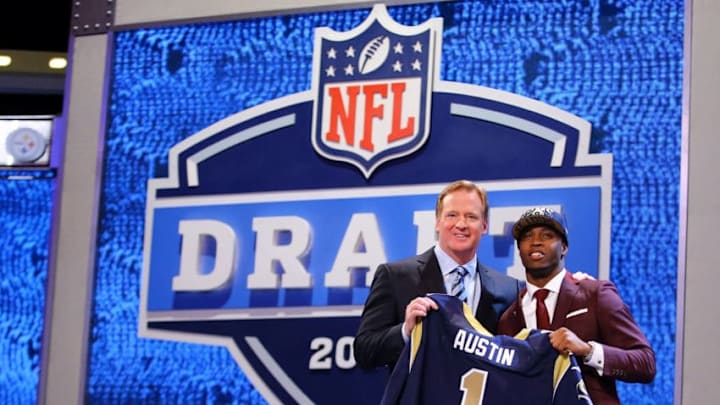The Los Angeles Rams have a first-round pick for the first time since the 2016 NFL Draft and the team’s past indicates that trend should continue.
The Los Angeles Rams have the 31st overall pick in the 2019 NFL Draft after falling to the New England Patriots in Super Bowl LIII.
It was the Patriots who owned the Rams’ first-round pick in 2018 after the team traded the pick in exchange for Brandin Cooks, who signed an extension with LA. Ironically, the Patriots’ selection, Sony Michel, had the only touchdown of the Super Bowl. Cooks nearly had the Rams’ only touchdown.
The year prior to that, the Rams’ first-round draft pick belonged to the Tennessee Titans, who acquired the pick after trading down in the 2016 NFL Draft so the Rams could select quarterback Jared Goff.
More from LA Sports Hub
- Lakers: 5 Players to Target Through Trades to make another championship run
- LA Chargers: Week 8 against Denver Broncos is a must-win
- LA Rams: Jared Goff wants to keep the Los Angeles title streak going
- Lakers Rumors: Los Angeles Clippers interested in Rajon Rondo
- LA Chargers: Justin Herbert wins AFC Rookie of the Month
April 3 will mark the one-year anniversary of the Rams trading for Cooks, which indicates that the team could still get a deal done and once again not have a first-round pick. And if you look at their drafting history, it might actually be better for the Rams to trade the pick.
The Rams have not been great in drafting first-round talents this decade, although there are some notable exceptions. Todd Gurley and Aaron Donald are the two most important players on the roster and were first-round picks.
However, both prospects pretty much fell into the Rams’ lap and they would have been foolish to not select either. It wasn’t a case of the team making a good selection when there were multiple options available.
Many would say Goff was a good selection but that is still up for judgment. Goff has been great the last two years but there are still doubts that he can get over the hump and win a Super Bowl. That kind of is the expectation when you are the first overall selection.
Aside from those three, which are ironically the last three first-round picks that the team has had, the Rams are poor. The team selected tackle Greg Robinson, who is no longer with the team, with the second pick in 2014. Not counting Donald, 11 Pro Bowlers were taken in the subsequent 15 picks.
The two picks from 2013, Alec Ogletree and Tavon Austin, are also no longer with the team. Austin was a complete flop and Ogletree was talented but didn’t fit this defense. The 2013 class was not great but All-Pro center, Travis Frederick, was selected just one pick after Ogletree.
Michael Brockers was the team’s selection in 2012 and to his credit, he is still on the team and plays a productive role. To say he has been bad is unfair. However, Pro Bowlers Melvin Ingram and Chandler Jones were selected four picks and seven picks after Brockers, respectively.
Robert Quinn, another player that is no longer with the team, was selected with the 14th overall pick in the 2011 draft. He is a two-time Pro Bowler and even recorded a 19 sack season in 2013. However, that came when the Rams were irrelevant and the team was unable to recreate that in his last three seasons in LA.
Finally, to round it off we have the perfect metaphor in Sam Bradford, who was selected with the first overall pick in 2010. Every other player in the top-seven are Pro Bowlers and Bradford will go down as the most average quarterback in NFL history.
Hindsight is always 20/20 but the Rams have proven to us that they do not have the same in the first round as other teams do.
Just look at their crosstown rivals, the Los Angeles Chargers. Since 2010, seven of the team’s nine first-round picks are Pro Bowlers. Once wide receiver Mike Williams makes that jump, which he is showing signs of making this season, it will be five Pro Bowlers in the last five years.
The Los Angeles Rams have some good selections this decade but have more bad than good. If there is a trade available, the team would benefit more from trading its first-round pick, whether that means getting an established talent are bolstering the number of picks in the second and third rounds.
